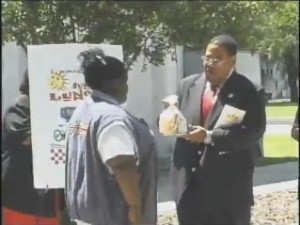Third annual AV Archives Night Shines the Spotlight on Southern US
Join AVPreserve for the third annual AV Archives Night, coinciding with the Society of American Archivists annual conference in Atlanta, Georgia. The event, a night of movies and sound highlighting archival collections from organizations in the southern United States, takes place from 7:30 to midnight on August 3rd at The Sound Table (483 Edgewood Ave SE, Atlanta, GA 30312) in the Old Fourth Ward.
The main event for the evening is a screening of historic videos and oral histories from eleven (and counting!) institutions from across the US. In addition, throughout the night, Lance and April Ledbetter of Dust to Digital will provide a collection of music spotlighting the sounds of Georgia. And, all-archivist band, Glass Plate Zero, will play a set of “history’s greatest rock and roll.”
Participating institutions include:
- • The Alan Lomax Archive, with the American Folklife Center at the Library of Congress
• Appalshop
• CARE
• Delta Air Lines Archive – Delta Flight Museum
• Florida State University Libraries
• Jimmy Carter Presidential Library and Museum
• Louie B. Nunn Center for Oral History – University of Kentucky Libraries
• Rodgers and Hammerstein Archives of Recorded Sound – The New York Public Library
• Russell Library for Political Research and Studies, University of Georgia
• South Carolina Political Collections and Moving Image Research Collections,
University of South Carolina Libraries
• Special Collections Research Center – North Carolina State University Libraries
• Walter J. Brown Media Archives and Peabody Awards Collection, University of Georgia
Glass Plate Zero is:
- • Hillel Arnold, Rockefeller Archive Center
• Heather Fox, University of Louisville
• Rory Grennan, Florida State University
• Gino Pasi, University of Cincinnati
The night’s venue, The Sound Table, serves small plates and cocktails from 7pm, so consider dining in house before the event.
To top off the evening, AVPreserve’s own Bertram Lyons and Dust to Digital’s Lance Ledbetter will spin some of their favorite records from Memphis and Atlanta respectively at The Sound Table’s bar. See the Facebook Event details here: https://www.facebook.com/events/1128264930577623/.
AV Archives Night is sponsored by AVPreserve, with support from the Association of Moving Image Archivists (AMIA),Dust to Digital, and the Digital Library of Georgia. Have a question? Contact Amy Rudersdorf at amy@avpreserve.comor tweet the hashtag #AVArchivesNight.


